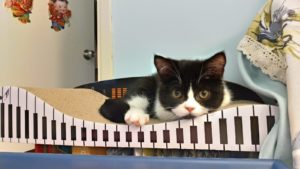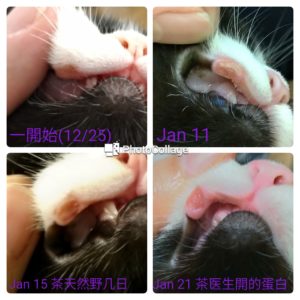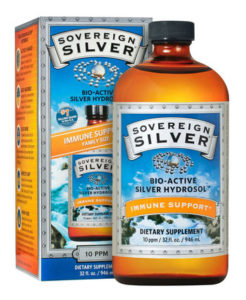Holistic Help For Rodent Ulcers In Cats

BB the kitten, Photo credit: Mandy Cheuk
More and more cat parents are starting to search for more natural, drug-free remedies and solutions to health conditions. Mandy, a concerned cat mom, reached out to me this week with a question concerning a rodent ulcer her kitten has developed. Up until a year ago I had never heard of such a thing. However, when one of my clients developed one I had to start researching.
What is a rodent ulcer?
Despite the scary sounding name, this skin condition has nothing to do with rats. The scientific name is eosinophilic granuloma complex, also known as an indolent ulcer. It’s actually a skin condition that commonly produces lesions around a cat’s lips, chin area or inside the mouth. Although they are not contagious, they can become very painful and infected.

BB’s rodent ulcer gradually worsened in a very short period of time. Photo credit: Mandy Cheuk
Causes of rodent ulcers in cats
Inflammatory in nature, they are caused by an allergic reaction. According to Critter Corner with Alissa Wolf, the most common causes include:
- The chemicals in plastic or rubber food and water bowls
- An allergy to fleas
- A food allergy
- Environmental pollutants, including chemicals in cat litter
When the body has an allergic reaction to something it sends white blood cells to the area to fight it. An article in The Nest describes the process like this: “Eosinophils, a kind of white blood cell, function as part of kitty’s immune system. When the body signals that parasites or allergens have invaded, eosinophils go on the attack, releasing chemicals to repel the invaders. With allergens, eosinophil activity sometimes backfires, causing rodent ulcers.”
Treatment for rodent ulcers in cats
The conventional veterinary approach to treating rodent ulcers is to give a steroid shot. I disagree with this for or two reasons: it will only suppress the immune system, and it puts a band-aid on the problem. Therefore, once the steroid wears off the condition will return and may develop into a chronic condition. Having to be on steroids for life is not a healthy solution either.
Find and treat the cause!
The best way to find the cause is to muscle test! Muscle testing is a non-invasive technique that identifies and address stressors in the body. Also known as body wisdom, it taps into the autonomic nervous system. (To learn more about muscle testing check out this page.) Simply asking the cat’s body questions, either in person or remotely, you can determine which stressor is causing the allergic reaction.
My first exposure to rodent ulcers in cats was a client named Yuri. I found that her immune system was “on fire” because she was inappropriately vaccinated when she was too young. Her devoted mom worked with me along with a couple of holistic and integrative veterinarians to help restore her immune system to its normal function. While detoxing and getting her immune system back in balance, she developed a rodent ulcer. It went away a short time later. You can read her story here.
Natural recommendations for treating and curing rodent ulcers
There are several ways to help your kitty without relying on drugs and steroids. First, eliminate the cause of the problem. Next, find the best tools to help strengthen the immune system.
What to eliminate
Eliminate the allergy. I use a holistic energy medicine technique to remove the body’s reaction to the stressor. Essentially this resets and restores a normal immune response.
Eliminate inflammatory ingredients in your cat’s food. Cats who eat a dry food diet are actually promoting more inflammation in their bodies. For cats with rodent ulcers an inflammatory diet just exacerbates the immune system’s disfunction. Ingredients like corn, rice, lentils, peas, garbanzo beans, and wheat are what manufacturers use as the “sticky ingredient” to make kibble. Cats are unable to digest the large percentage of carbohydrates in the food. Ultimately this leads to digestive issues and an inflammatory response. Instead, your cat is much better off eating a wet, meat-based diet with no more than 7-8% carbohydrate in the recipe.
Eliminate environmental irritants. If your cat goes outside or is exposed to fleas, using a natural, non-toxic flea repellent/treatment is a must. Using glass or ceramic food bowls, unscented cat litter, and non-toxic household cleaning and gardening products are simple ways to drastically reduce and/or eliminate unhealthy chemical exposure to pets.
How to rebuild
You’ve got to give the body tools that will help strengthen the immune system, and one of my favorites is colloidal silver 10 ppm. A natural, non-toxic, water-based product, colloidal silver is anti-viral, anti-bacterial and anti-fungal. The silver hydrosol molecules work naturally with the body to remove harmful invaders and allow the immune system to get strong again. Supplements like medicinal mushrooms, L-lysine, and and colostrum products are also great to build the immune system. To determine which product is best for your cat always muscle test first.
Has your cat ever developed a rodent ulcer? Share your experience in the comments below!

